No, the title of this column does not imply that your pastor is illiterate. No offense intended. My challenge is that all of us pastors need to read wider — much wider than we normally do.

Doyle Sager
|
I am assuming we read the Bible, along with Bible commentaries, theology, ethics, congregational leadership, pastoral care, church history and missions. We won’t take time and space to deal with those “givens” of our calling. I’m talking about reading wider still — biography, poetry, novels, short stories and science fiction. And if all of that sounds too highbrow, it isn’t. What I’m after is stirring the pastor’s imagination with real life. So reading about golf, motorcycles, gardening, crocheting or family genealogy will do as well.
Why should the pastor read widely? Because the people who listen to us on Sunday deserve our very best and have the right to expect an interesting sermon from an interesting person. We need to stamp out the notion that dull is the equivalent of spiritual depth!
Why should the pastor read widely? Because our congregation reads widely. Through our church newsletter, I occasionally ask my people what they are reading. I am amazed at the breadth and depth of some of the listings. Of course, the Internet has made knowledge accessible to everyone. Pastors, we need to keep up!
Why should the pastor read widely? Because reading widely keeps us in touch with real life. Whether it’s a spy thriller, the latest issue of National Geographic or your favorite blog, reading connects us to the human dilemma. Ralph Waldo Emerson once complained about a sermon he listened to. The preacher droned on and on about esoteric tidbits. During the sermon, as Emerson looked outside and saw the snow gently falling, he realized the snow was more real than the pastor! The incarnation of Jesus Christ — God come in the flesh — means that this world is real and is interesting to God. It should be interesting to us.
Cornelius Plantinga Jr. recently wrote a book titled “Reading for Preaching: The Preacher in Conversation with Storytellers, Biographers, Poets, and Journalists.” While the author affirms that the preacher should always begin and end with Holy Scripture, he also makes the case that reading widely will provide insight into how that Word impacts our culture.
Why should the pastor read widely? Reading sharpens our vocabulary. Paradoxically, a richer vocabulary may cut down on the number of words we use, rather than increasing the volume. Widening our reading world can teach us how to use language more concisely (try some poetry by Emily Dickinson or Robert Frost and see if you can excise some of your verbiage). Reading short stories and novels can make us better storytellers.
More than anyone else, preachers should remember that overused words may grow tired and worn out. Reading can provide us fresh flowers to replace some of our wilted adjectives and verbs.
My proposal is that both preacher and congregation take responsibility for teaching the pastor to read. Key lay leaders (deacons, personnel committee members, etc.) can lead the way. Here are several suggestions:
Offer your pastor time. Regular time off for a reading retreat or a study leave (other than vacation) could yield many blessings for the congregation as well as the pastor.
Offer your pastor money. Besides salary and other benefits, offer your shepherd a book allowance to be used for print or e-books. For birthday or Christmas gifts, why give the usual necktie or tree ornament? Why not offer your preacher a gift subscription to some journal or e-magazine?
Create within your church an atmosphere of reading and learning. Invite the entire congregation to read a book together and then discuss it over a period of weeks. Many pastors inform their church librarian of a book which will be highlighted in an upcoming sermon so that the library will have a copy available to check out at the appropriate time.
The Evangelist Luke tells us that he did thorough research before he laid out his Gospel (Luke 1:1-4). While in prison, the Apostle Paul asked Timothy to bring the books and parchments (2 Timothy 4:13). These examples from Scripture remind us that being uninformed or unprepared are not Christian virtues. After all, the concept of “learner” is imbedded in the very definition of disciple.
The people who sit and listen to us each Sunday have worked hard all week. They deserve to hear preachers whose imaginations have been fired up and filled up. Interesting people preach interesting sermons. And dull people? Well, you know….
Doyle Sager (doyle@fbcjc.org) is senior pastor of First Baptist Church in Jefferson City, Mo. His column appears in every other issue of Word & Way.






